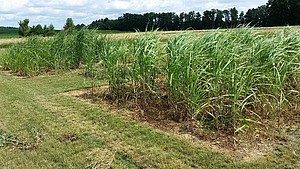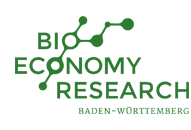Miscanthus genotypes for lignocellulose-based value chains

Perennial grasses as Miscanthus have high yield potential with low demand for fertilizers and pesticides and can therefore contribute to a sustainable biomass production. To avoid competing with food and feed production the usage of marginal sites, which are less suitable for agriculture due to several reasons is desired. But so far only the Miscanthus genotype Miscanthus x giganteus is available, which is not well adapted to the marginal conditions.
In the scope of this project, five new genotypes have been grown on three marginal sites in Baden-Württemberg and their dry matter yield as well as their biomass-composition were determined. In parallel, the environmental impact of the cultivation and of the subsequent use in various conversion pathways was evaluated through life cycle assessment.
Field trials on marginal sites have shown that the new genotypes provide similar yields compared to the so far used genotype Miscanthus x giganteus, whereby the costs for establishment are significant lower.
The main costs in growing Miscantus arise in the establishment phase since Miscanthus x giganteus can only be reproduced through the labour intensive usage of rhizomes. In contrast, the five new established genotypes can be reproduced using seeds, which are germinated in a greenhouse and then planted on the field. Due to the low weight of the seeds, direct sowing is not possible. However, promising methods for seed-based establishment have been developed within the framework of this project. Further experiments are necessary before these methods can be used in practice.
Several conversion pathways as for example the production of Miscanthus-based insulation material have been evaluated through life cycle assessment. Compared to fossil reference products, the environmental impact of analyzed Miscanthus based value chains was much lower, even if Miscanthus has been grown on marginal sites.
| Project title | Miscanthus genotypes for lignocellulose-based value chains |
| Institution | University of Hohenheim, Institute of Crop Science |
| Research group | Prof. Dr. Iris Lewandowski, Moritz Wagner |
| Project status | completed |
